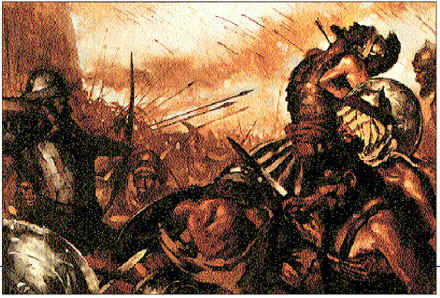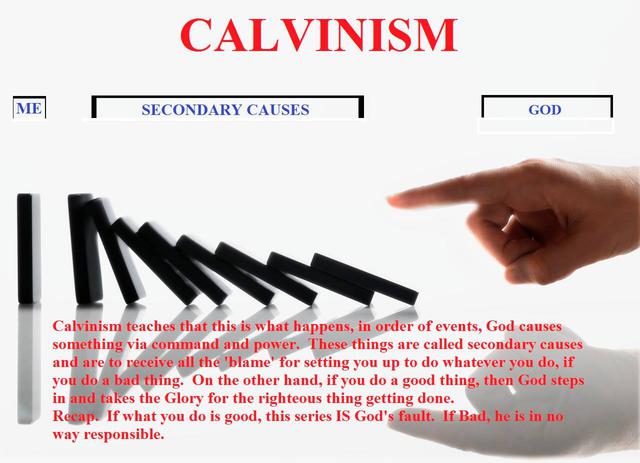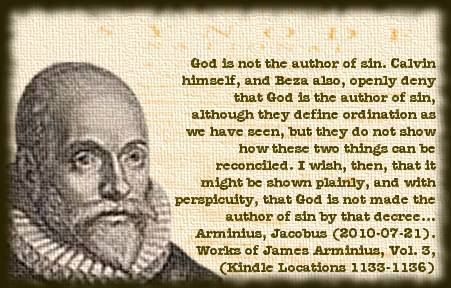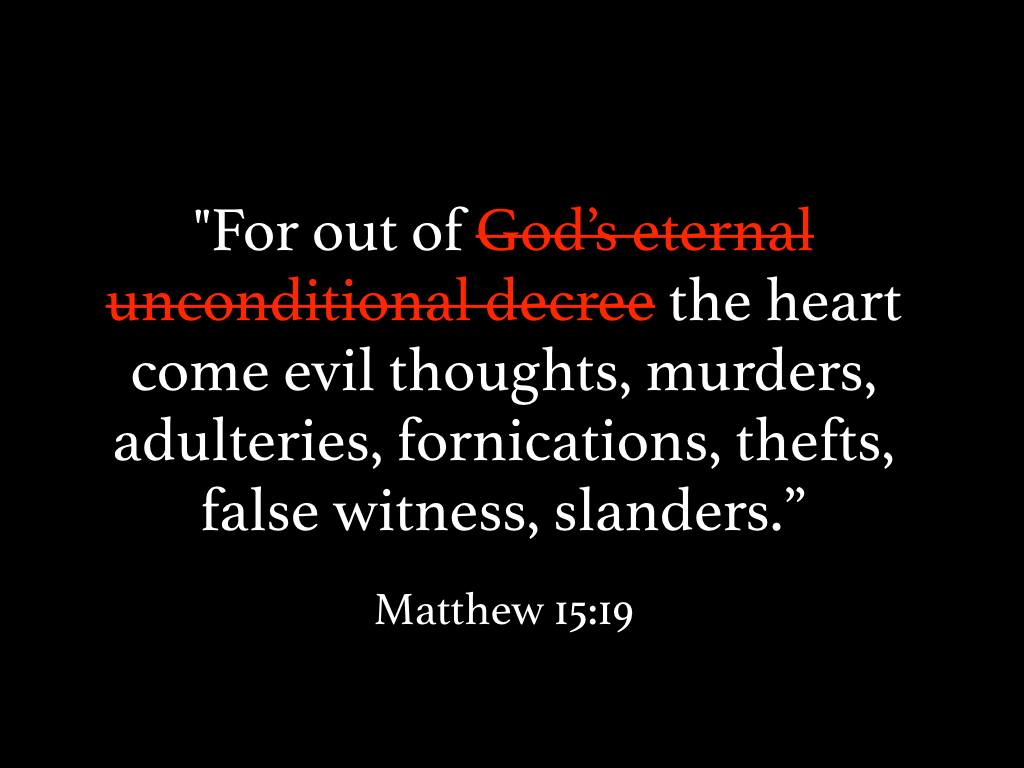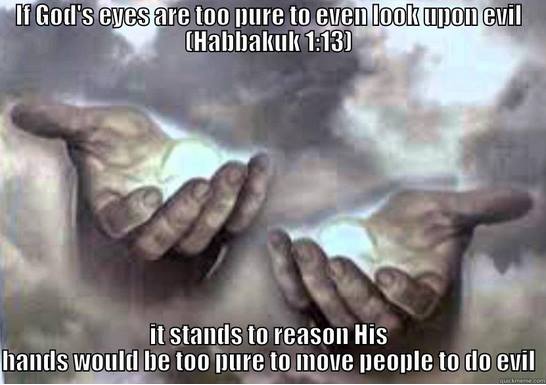Calvinism and Arminianism:
Myths & Realities
This charge first appeared in the affirmative, by the Gnostic, Florinus (c. 180), which was immediately attacked by Irenaeus (130-200), who published a discourse entitled: “God, not the Author of Sin.” Florinus’ doctrine reappeared in another form later in Manichaeism, of which Augustine, was initially a member for nearly a decade before converting to Catholicism.
Calvinist, R.C. Sproul: “The distortion of double predestination looks like this: There is a symmetry that exists between election and reprobation. God WORKS in the same way and same manner with respect to the elect and to the reprobate. That is to say, from all eternity God decreed some to election and by divine initiative works faith in their hearts and brings them actively to salvation. By the same token, from all eternity God decrees some to sin and damnation (destinare ad peccatum) and actively intervenes to work sin in their lives, bringing them to damnation by divine initiative. In the case of the elect, regeneration is the monergistic work of God. In the case of the reprobate, sin and degeneration are the monergistic work of God. Stated another way, we can establish a parallelism of foreordination and predestination by means of a positive symmetry. We can call this a positive-positive view of predestination. This is, God positively and actively intervenes in the lives of the elect to bring them to salvation. In the same way God positively and actively intervenes in the life of the reprobate to bring him to sin. This distortion of positive-positive predestination clearly makes God the author of sin
who punishes a person for doing what God monergistically and irresistibly coerces man to do. Such a view is indeed a monstrous assault on the integrity of God. This is not the Reformed view of predestination, but a gross and inexcusable caricature of the doctrine. Such a view may be identified with what is often loosely described as hyper-Calvinism and involves a radical form of supralapsarianism. Such a view of predestination has been virtually universally and monolithically rejected by Reformed thinkers.” (Double Predestination, emphasis mine)
According to Sproul, it is undeniable that God is made the author of sin IF, from all eternity, He has decreed anyone to sin and damnation by efficaciously working sin in their lives. Such a thing, he calls a “monstrous assault on the integrity of God.” However, is that not exactly what John Calvin taught, then denied, then affirmed and then declared that curious men are not to peer into the secrets of God, just as we are not to curiously peer into the Sun itself? As Calvin speaks, what you will find is that God is made the author of sin, but is not to be held guilty of sin because He allegedly brings it about through secondary causes, while He Himself is the proximate cause and Determiner. But first, Calvin will explain the Providence of God from the Deterministic perspective, and then he will address his opponents, and finally he will condemn the curious who seek to examine him too fully.
The Providence of God from the Deterministic Perspective:
John Calvin: “We also note that we should consider the creation of the world so that we may realize that everything is subject to God and ruled by his will and that when the world has done what it may, nothing happens other than what God decrees.” (Acts: Calvin, The Crossway Classic Commentaries, p.66, emphasis mine)
John Calvin: “First, the eternal predestination of God, by which before the fall of Adam He decreed what should take place concerning the whole human race and every individual, was fixed and determined.” (Concerning the Eternal Predestination of God, p.121, emphasis mine)
John Calvin: “God had no doubt decreed before the foundation of the world what He would do with every one of us and had assigned to everyone by His secret counsel his part in life.” (Calvin’s New Testament Commentaries: Galatians, Ephesians, Philippians and Colossians, p.20, emphasis mine)
John Calvin: “…the reason why God elects some and rejects others is to be found in His purpose alone. … before men are born their lot is assigned to each of them by the secret will of God. … the salvation or the destruction of men depends on His free election.” (Calvin’s New Testament Commentaries: Romans and Thessalonians, p.203, emphasis mine)
The Providence of God from Secret Purpose Perspective:
John Calvin: “Let him, therefore, who would beware of such unbelief, always bear in mind, that there is no random power, or agency, or motion in the creatures, who are so governed by the secret counsel of God, that nothing happens but what he has knowingly and willingly decreed.” (The Institutes of Christian Religion, Bk. 1, Ch. 16, Sect. 3, emphasis mine)
John Calvin: “This, however, they erroneously confine to particular acts. The thing to be proved, therefore, is, that single events are so regulated by God, and all events so proceed from his determinate counsel, that nothing happens fortuitously.” (The Institutes of Christian Religion, Book I, Ch. 16, Sect. 4, emphasis mine)
John Calvin: “When he uses the term permission, he means that the will of God is the supreme and primary cause of everything, because nothing happens without his order of permission.” (The Institutes of Christian Religion, Book I, Ch. 16, Sect. 8, emphasis mine)
John Calvin: “He has plenty of reasons for comfort as he realises that the devil and all the ungodly are reined in by God, so that they cannot conceive, plan or carry out any crime, unless God allows it, indeed commands it. They are not only in bondage to him, but are forced to serve him. It is the Lord’s prerogative to enable the enemy’s rage and to control it at will, and it is in his power to decide how far and how long it may last, so that wicked men cannot break free and do exactly what they want....” (The Institutes of Christian Religion, Book I, Ch.17, Sect. 10, emphasis mine)
Calvin denies that God is the Author of Evil:
John Calvin: “First, it must be observed that the will of God is the cause of all things that happen in the world; and yet God is not the author of evil.” (Concerning the Eternal Predestination of God, p.169, emphasis mine)
Calvin address the Paradoxical nature of his theory:
John Calvin: “For myself, I take another principle: Whatever things are done wrongly and unjustly by man, these very things are the right and just works of God. This may seem paradoxical at first sight to some....” (Concerning the Eternal Predestination of God, p.169, emphasis mine)
Calvin establishes Secondary Causes with Man:
John Calvin: “Further what I said before is to be remembered, that since God manifests His power through means and inferior causes, it is not to be separated from them.” (Concerning the Eternal Predestination of God, p.170, emphasis mine)
Calvin establishes Primary Causes with God:
John Calvin: “But where it is a matter of men’s counsels, wills, endeavours, and exertions, there is greater difficulty in seeing how the providence of God rules here too, so that nothing happens but by His assent and that men can deliberately do nothing unless He inspire it.” (Concerning the Eternal Predestination of God, pp.171-172, emphasis mine)
John Calvin: “Indeed, the ungodly pride themselves on being competent to effect their wishes. But the facts show in the end that by them, unconsciously and unwillingly, what was divinely ordained is implemented.” (Concerning the Eternal Predestination of God, p.173, emphasis mine)
John Calvin: “Does God work in the hearts of men, directing their plans and moving their wills this way and that, so that they do nothing but what He has ordained?” (Concerning the Eternal Predestination of God, p.174, emphasis mine)
John Calvin: “For the man who honestly and soberly reflects on these things, there can be no doubt that the will of God is the chief and principal cause of all things.” (Concerning the Eternal Predestination of God, p.177, emphasis mine)
John Calvin: “But of all the things which happen, the first cause is to be understood to be His will, because He so governs the natures created by Him, as to determine all the counsels and the actions of men to the end decreed by Him.” (Concerning the Eternal Predestination of God, p.178, emphasis mine)
Calvin concedes that which God permits, He authors:
John Calvin: “But it is quite frivolous refuge to say that God otiosely permits them, when Scripture shows Him not only willing but the author of them.” (Concerning the Eternal Predestination of God, p.176, emphasis mine)
Calvin faces the dilemma:
John Calvin: “But the objection is not yet resolved, that if all things are done by the will of God, and men contrive nothing except by His will and ordination, then God is the author of all evils.” (Concerning the Eternal Predestination of God, p.179, emphasis mine)
John Calvin: “They again object, Were not men predestinated by the ordination of God to that corruption which is now held forth as the cause of condemnation? If so, when they perish in their corruptions they do nothing else than suffer punishment for that calamity, into which, by the predestination of God, Adam fell, and dragged all his posterity headlong with him. Is not he, therefore, unjust in thus cruelly mocking his creatures? I admit that by the will of God all the sons of Adam fell into that state of wretchedness in which they are now involved; and this is just what I said at the first, that we must always return to the mere pleasure of the divine will, the cause of which is hidden in himself. But it does not forthwith follow that God lies open to this charge.” (The Institutes of Christian Religion, Book 3, Chapter 23, section 4, emphasis mine)
John Calvin: “Thinking that the difficulty here may be resolved by a single word, some are foolish enough serenely to overlook what occasions the greatest ambiguity; namely, how God may be free of guilt in doing the very thing that He condemns in Satan and the reprobate and which is to be condemned by men.” (Concerning the Eternal Predestination of God, p.179, emphasis mine)
John Calvin: “We learn that nothing happens but what seems good to God. How then is God to be exempted from the blame to which Satan with his instruments is liable?” (Concerning the Eternal Predestination of God, p.180, emphasis mine)
Calvin gives his answer:
John Calvin: “What I have maintained about the diversity of causes must not be forgotten: the proximate cause is one thing, the remote cause another.” (Concerning the Eternal Predestination of God, p.181, emphasis mine)
John Calvin: “Certain shameless and illiberal people charge us with calumny by maintaining that God is made the author of sin, if His will is made first cause of all that happens. For what man wickedly perpetrates, incited by ambition or avarice or lust or some other depraved motive, since God does it by his hand with a righteous though perhaps hidden purpose--this cannot be equated with the term sin.” (Concerning the Eternal Predestination of God, p.181, emphasis mine)
John Calvin: “Must we then impute the guilt of sin to God, or invent a double will for Him so that He falls out with Himself? I have shown that He wills the same as the criminal and the wicked, but in a different way. So now it is to be maintained that there is diversity of kinds while He wills in the same way, so that out of the variety which perplexes us a harmony may be beautifully contrived.” (Concerning the Eternal Predestination of God, p.184, emphasis mine)
To test the validity of Calvin’s secondary causes defense, consider the analogy of a husband who hires a contract-killer to murder his wife. After the crime is committed, and both parties are arrested, do you suppose that in court, the husband will be declared “Not Guilty” by reason that he was merely the Conspirator? Will he be exonerated on the grounds that someone else, namely a secondary cause, was the one who actually pulled the trigger? In reality, however, the Prosecutor will, most often, offer to Plea Bargain with the secondary agent in order to levy their greatest charge against the primary agent. Therefore, not only does the “secondary causes defense” fail to exonerate the Conspirator, it further backfires as the Conspirator is the one held in greatest contempt.
How did the “secondary causes”
defense work out for David?
See 2nd Samuel 11:1-27.
“But the thing that David had done
was evil in the sight of the LORD.”
(2nd Samuel 11:27) Nathan says,
“You have struck down Uriah the
Hittite with the sword,” thus
implying that David committed
the crime by making it happen.
(2nd Samuel 12:9)
One member of The Society of Evangelical Arminians: “Secondary causes indeed don’t affect who ultimately performs the action. David, when approached by Nathan for murdering Uriah, didn’t protest, ‘I didn’t kill him! I just sent a letter to Joab who gave him a suicide mission and put him in the way of the enemy archers who killed him! It wasn’t me-it was the secondary causes!’ It doesn’t matter how many layers of causation there are, the mastermind behind the crime is always guilty.”
Dave Hunt asks: “Would God not be culpable, at least as a partner in crime, for causing man to sin? No, says the Calvinist, because we can’t apply our standards to God.” (Debating Calvinism, p.312)
That’s called Special Pleading.
One member of The Society of Evangelical Arminians: “It’s doubletalk. God ‘orders’ and ‘controls’ all things, but do not blame Him when things go exactly according to His plan because sinful people do sinful things. But don’t sinful people do the sinful things that God has ‘ordered,’ ‘planned,’ and ‘directed’? ‘Well, yes,’ says the Calvinist, ‘but God is still not to blame.’ Why? ‘Because we said so, and that settles it!’ Oh, I see.”
Calvin warns against curiosity into the Hidden Will:
John Calvin: “It is any wonder that such immense splendour should blunt the acuteness of our mind? Our physical eyes are not enough to sustain a contemplation of the sun. Is our spiritual insight greater than our natural powers, or the majesty of God inferior to the glory of the sun? Is it becoming in us, then, not to be too inquisitive....” (Concerning the Eternal Predestination of God, pp.184-185, emphasis mine)
In other words, the concept of “‘Come now, and let us reason together,’ Says the LORD” (Isaiah 1:18), doesn’t apply to Calvinism, which leads to this conclusion: The difference between a Calvinist and a Hyper-Calvinist is that the Hyper Calvinist makes no attempt to hide their contradiction.
Another member of The Society of Evangelical Arminians: “Once you get through the obfuscating verbosity it is a straightforward contradiction.”
Calvin address what he terms “the scoffers”:
John Calvin: “These shallow people imply that the prayers of the faithful must be misguided and unnecessary, because they beg the Lord to act in things which he has decreed from eternity. Attributing whatever happens to the Providence of God, they excuse the person who has deliberately planned it. Has a murderer killed an innocent man? He has only, they say, carried out God’s will. Has someone committed theft or adultery? He is merely the one who carries out what the Lord has ordained. Has a son stood by, waiting for his parents to die, without trying to do anything? He must not oppose God, who had planned it all from eternity. In this way, all crimes are called virtues, because they must be according to God’s will.” (The Institutes of Christian Religion, Book 1, Chapter 17, Section 3, emphasis mine)
According to Calvin’s Deterministic Calvinism, is all murder the secret will of God? Is all theft and adultery exactly what the Lord hath authored, ordained and inspired? Is the cruelty of a family member exactly what God planned from all eternity? Does Calvinism inescapably render all crimes as “virtues”?
Non-Calvinist, Jim Foster: “The part of God’s sovereignty that Calvinists don’t understand is that in His sovereignty, He gave us free wills. We are the ones who have taken that free will and decided to commit sin. Otherwise, God is somehow linked to all the world’s atrocities from the beginning of time and is ultimately responsible for them. The idea that God would ordain evil is contrary to everything the Bible teaches about God. A Calvinist would be forced to conclude - if God is good and is responsible for all evil - then evil must be good.”
Dave Hunt: “The entire history of mankind becomes a puppet show, with God the puppeteer. He looked down upon men and saw that ‘the wickedness of man was great…. Every imagination of the thoughts of his heart was only evil continually…. The earth also was corrupt…and…filled with violence’ (Genesis 6:5, 11). This situation ‘grieved [God] at his heart.’ But, if as Calvinism says, God caused every evil thought, word, and deed, why was He grieved? And how could God be grieved if He could have caused those living in Noah’s day to be saints rather than sinners but instead chose to damn them? Yet God is love?” (Debating Calvinism, p.314, emphasis mine)
Arminian, John Wesley comments about the ultimate implication of Calvinism: “…one might say to our adversary, the devil, ‘Thou fool, why dost thou roar about any longer? Thy lying in wait for souls is as needless and useless as our preaching. Hearest thou not, that God hath taken thy work out of thy hands; and that he doeth it much more effectually? Thou, with all thy principalities and powers, canst only so assault that we may resist thee; but He can irresistibly destroy both body and soul in hell! Thou canst only entice; but his unchangeable decrees, to leave thousands of souls in death, compels them to continue in sin, till they drop into everlasting burnings. Thou temptest; He forceth us to be damned; for we cannot resist his will. Thou fool, why goest thou about any longer, seeking whom thou mayest devour? Hearest thou not that God is the devouring lion, the destroyer of souls, the murderer of men? Moloch caused only children to pass though the fire: and that fire was soon quenched; or, the corruptible body being consumed, its torment was at an end; but God, thou are told, by his eternal decree, fixed before they had done good or evil, causes, not only children of a span long, but the parents also, to pass through the fire of hell, the “fire which never shall be quenched; and the body which is cast thereinto, being now incorruptible and immortal, will be ever consuming and never consumed, but “the smoke of their torment,” because it is God’s good pleasure, “ascendeth up for ever and ever.”’” (Free Grace, Sermon 128, Preached at Bristol, in the year 1740, emphasis mine)
Is this a fair charge against Calvinism? Has God taken the work of the devil out of His hands and done it more effectively by irreversible, eternal decrees?
The Calvinistic, Westminster Confession of Faith: “The almighty power, unsearchable wisdom, and infinite goodness of God so far manifest themselves in his providence, that it extendeth itself even to the first fall, and all other sins of angels and men; and that not by a bare permission, but such as hath joined with it a most wise and powerful bounding, and otherwise ordering, and governing of them, in a manifold dispensation, to his own holy ends; yet so, as the sinfulness thereof proceedeth only from the creature, and not from God, who, being most holy and righteous, neither is nor can be the author or approver of sin.” (The Westminster Confession of Faith, IV. Of Providence, emphasis mine)
This is a fancy way of saying that God decreed sin, but did not the author of sin. Perhaps what is meant is that God is the author of sin, but is not guilty of sin, since it is carried out by secondary causes. However, the Bible reveals that God is not the author of any of it, when it states: “For God is not the author of confusion, but of peace, as in all churches of the saints.” (1st Corinthians 14:33, KJV) In that passage, the reason why God is “not the author of confusion” is because God didn’t design for there to be chaos in His church by the misuse of the gift of tongues. Therefore, it stands to reason, that if God is not the author of confusion, He could not, therefore, have planned confusion. Similarly, then, if God is not the author of sin, He could not have planned sin. While it’s one thing for God to allow and then use the evil intentions of man to accomplish good, it’s quite another thing to plot evil as its source.
Calvinists allege that it pleased God to decree sin, based upon such verses as Genesis 50:20 and Psalm 115:3. However, if God decreed abomination, consider Jeremiah 32:35, which states: “They built the high places of Baal that are in the valley of Ben-hinnom to cause their sons and their daughters to pass through the fire to Molech, which I had not commanded them nor had it entered My mind that they should do this abomination, to cause Judah to sin.” For if it didn’t even enter God’s mind that Israel should commit this abomination, how then, can the Calvinists simultaneously say that it entered God’s mind to sovereignly decree that they must do it? Must they invent a contradictory Double Will?
Calvinist, Erwin Lutzer: “The devil is also a being filled with only hatred and deceit. He is a rebellious liar and malicious sadist. He desires to see humans suffer for suffering’s sake. Thus he always stands in opposition to God even when he does what God ordains.” (The Doctrines That Divide, p.221, emphasis mine)
If God was merely turning the unrepentant wicked over into the hands of the devil for judgment, then I would agree that there could still be a logical basis for the devil still remaining in opposition to God despite carrying out God’s orders. However, if you add that God is the one who decreed that the individual should be formed from the womb as unrepentant and wicked, in having allegedly, decided that person’s lot in life by a decreed Script of Life, which includes a world full of wickedness, then there would be no remaining logical basis to separate the decree-er from what is decreed. Blind decrees, with no real foreknowledge, unavoidably would render God as the author of sin. Calvinists can deny the charge all they wish, but simply denying something doesn’t make it untrue. The only logical answer, that I’ve seen from Calvinists, is that if God is not concerned about being the author of sin, then why should they? At least that Calvinist, isn’t throwing up one smoke screen after another, and is honestly addressing the unavoidable ramifications of Calvinism.
John Calvin: “If those who attribute the hardening of men to His eternal counsel invest God with the character of a tyrant, we are certainly not the author of this opinion.” (Concerning the Eternal Predestination of God, p.60, emphasis mine)
In other words, if anyone thinks that blindly predestining sin, makes the Predestinator a “tyrant,” then he doesn’t agree. But why not? Are not men who plot wickedness, themselves wicked? Therefore, if God allegedly wrote the Script of Life with a world full of wickedness, what’s the difference?
The evil intentions of man do not originate with God, but within man’s own sinful nature. By God’s Middle Knowledge, He weighs a man’s heart (Proverbs 21:2), and with His infinite understanding (Psalm 147:5), He formulates His own plan. If God does not ponder a man’s heart before enacting His own plans, then why is it that the Bible teaches at Acts 2:23, that God’s predetermined plan is accompanied by His Foreknowledge?
Next let’s another plank of Calvinism, regarding the foreordination of sin:
The Westminster Confession of Faith: “God from all eternity did by the most wise and holy counsel of his own will, freely and unchangeably ordain whatsoever comes to pass; yet so as thereby neither is God the author of sin; nor is violence offered to the will of the creatures, nor is the liberty or contingency of second causes taken away, but rather established.” (Of God’s Eternal Decree, emphasis mine)
That’s twice now, that we have seen the Westminster Confession of faith, deny that God is the “author or approver of sin,” while yet in relation to sin, we see the words “ordering” and “ordain.”
Calvinist, R.C. Sproul: “If He decides to allow something, then in a sense he is foreordaining it.” (Chosen By God, p.26, emphasis mine)
Calvinist, Erwin Lutzer: “Both Calvinists and Arminians teach that God does not and cannot do evil. Calvinists say that God nonetheless ordains it through secondary causes. Arminians say God only permits it. Nonetheless, his permission necessarily means that he bore ultimate responsibility for it. After all, he could have chosen ‘not to permit it.’” (The Doctrines that Divide, pp.209-210, emphasis mine)
Does that mean that the father of the Prodigal Son, necessarily bore ultimate responsibility for his wayward son’s sinful lifestyle, simply because he permitted him to leave with his share of the inheritance? Who would argue such a point?
Furthermore, if there is room in foreordaining for permission, then why didn’t the Westminster state: God from all eternity did...allow whatsoever comes to pass? Yet, we have also seen from the Westminster the alleged, immutable decree [script] it is “not by a bare permission.” Adopting Calvin’s defense, the Westminster employs the now exposed, “second causes” defense.
R.C. Sproul: “If there is one single molecule in this universe running around loose, totally free of God’s sovereignty, then we have no guarantee that a single promise of God will ever be fulfilled. Perhaps that on maverick molecule will lay waste all the grand and glorious plans that God has made and promised to us.” (Chosen By God, pp.26-27, emphasis mine)
What if that “one molecule” was sin? What if someone committed an abomination that God never decreed anyone to commit? (Jeremiah 32:35) What if someone committed an act that was beyond what He intended? (Zechariah 1:15) Will these molecules of sin, outside the will of God, shake loose God’s throne in heaven, and give Satan a chance to catch God off guard? Listen, God is eternal, which means that He dwells independent of time. You don’t have to worry about His sovereignty. He is omniscient and omnipresent. Nothing remains unknown to Him, nor is anything able to find a place to hide from Him. By God’s omniscient, Middle Knowledge, He not only knows what you will do, but also what you could and would do, in any situation. However, Calvinist philosophers, modern and historical, who’ve wished to protect God’s sovereignty, have extended to Him the odious origin of sin, though vehemently denying the guilt of sin, by means of secondary causes:
R.C. Sproul: “If is true that in some sense God foreordains everything that comes to pass, then it follows with no doubt that God must have foreordained the entrance of sin into the world. That is not to say that God forced it to happen or that he imposed evil upon his creation. All that means is that God must have decided to allow it to happen.” (Chosen By God, p.31, emphasis mine)
R.C. Sproul: “In spite of this excruciating problem we still must affirm that God is not the author of sin.” (Chosen By God, p.31, emphasis mine)
Why? Why must you fight this argument to your last breath, as if it was the Boogeyman of Calvinism? Suppose that God was, in fact, the author of sin? Why would you need to fight it? If God was not concerned about it, then why should you be? Really, in the end, the only thing that matters is what the Bible says. So for Calvinists to belligerently draw their lines in the sand, concerning the “author of sin” charge, only sets themselves up to be considered, irrational. It seems that you could say almost the same exact thing, but with different wording, and that would pacify the Calvinists, and indeed, that’s exactly what Sproul has done when he claims that God foreordained the entrance of sin, but did not author sin. I’d like to know where the difference lies. In other words, God is the entrance of sin into the world, but by no means whatsoever, by any stretch of the imagination, is He the author of sin into the world. That, we just can’t have, says the Calvinist, end of discussion. Since Calvinists have tinkered with the definition of ordain, why don’t they simply tinker with the definition of author? In other words, God may have authored the Script of Life which contains sin, but He, by no means, endorses their behavior, no more than J.R.R Tolkien endorses the behavior of Sauron. However, real life is not like a book, in which there is a Script of Life by which men play parts in a Divine play at the direction of God. That is more philosophy than theology. This is not to say that God does not have books, plans and decrees. Of course He does, but do not forget that real foreknowledge is the basis for God’s decrees. (Acts 2:23)
Question: Why did sin enter the world?
According to Calvinism: It’s part of God’s master plan to display His attributes, specifically, His attribute of wrath, which He is just as delighted to express as any other attribute. In this way, it is taught that God brought sin into the world, in order to have someone upon which to be wrathful.
According to Arminianism: God made everything good (Genesis 1:31; 1st Timothy 4:4), and when God created man, He created man in His own image, which reflects His own freedom. Therefore, man’s Free Will is the origin of evil.
Adrian Rogers: “God is the author of everything. God made everything perfect, and when God made man, God man His creature perfectly free. Free Will, then, man’s Free Will, is the origin of evil. God did not create evil. God created perfection, and God made man perfectly free, and freedom therefore gave rise to this evil. You see, this is what makes us moral creatures. Somebody says, ‘Why didn’t God just make us where we couldn’t sin?’ Well if God had made us where we couldn’t sin, He could have no more fellowship with me than I could have with that pulpit or that speaker. Because God made us moral creatures; love is the highest good; and God wants us to love Him. This is the first and great commandment: ‘Thou shalt love the Lord thy God with all thy heart, with all thy soul, with all thy strength, with all thy mind.’ Love is the highest good, but forced love is a contradiction in terms. Forced love is not love at all. In order to love, we must be free to love, to choose to love, and to choose to love, we have to be able to choose not to love. And so God gave us perfect choice. Adam chose in the Garden of Eden, and the sons of Adam after him, to sin, and that’s where the heart-ache, and the groan and the moan come from, as we’re going to see in a moment.” (Turning Hurts Into Hallelujahs: Romans 8:8-11, emphasis mine)
The Calvinist argument against the problem of evil, is to make it just as much of a problem for Arminianism as well. The way that it is explained is that there is really no difference between God predetermining sin (Calvinism) vs. God foreknowing sin and doing nothing to stop it (Arminianism). In other words, for God to permit sin would make Him no less culpable as if He had caused it in the first place. Here is the argument:
If God is against sin, then why, by Calvinist accounts, would God “script” the very thing that He is against? To a Calvinist, God does whatever He does for His utmost glorification, and thus the sin that He scripts must be to His utmost glorification, but if that is so, then is He really against sin after all? This remains an open question.
If God is against sin, then why, by Arminian accounts, would God “permit” the very thing that He is against? To an Arminian, God does whatever He does for His ultimate joy, and thus the sin that He permits must be to His ultimate joy, but if that is so, then is He really against sin after all? Well, yes, because sin is not a means to His joy, since God could have had joy in a relationship with Adam and Eve whether they fell or not. However, with Calvinism, sin and the Fall are absolutely essential to whether God would have a vehicle upon which to “display His various attributes,” as the Calvinist account requires.
Calvinist, Lee Shelton: “Imagine the following situation:
I’m out for an evening stroll when I smell something
burning. I look around and notice flames in one of the
second floor windows of a neighbor’s house. In the other
window, I can see a little girl pounding on the glass and
can hear her cries for help. I do nothing. I don’t even use
my cell phone to call 911. I just stand there watching
until the entire house is engulfed in flames and the little
girls dies. Now, since I was perfectly capable of saving
her, but chose not to, how could anyone with a
conscience say that I was not responsible for her death?
From a basic human perspective, there wouldn’t be any
doubt. By standing there and doing nothing as that little
girl burned to death, I would be just as culpable as if I
had started the fire in the first place.” (A Burning
Calvinist, Lee Shelton: “So, here’s the question I have for you Arminians: If a sovereign, loving, all-powerful God neither ordains nor causes bad things to happen, but simply stands by and allows them to happen, then how does he escape responsibility for the pain and suffering of those involved? (Keep in mind that the “bad things” being talked about here can refer to everything from the stubbing of one’s toe to the eternal damnation of one’s soul.) I submit that you cannot answer that question without betraying your own Arminian worldview. You cannot answer it without resorting to the same theological gymnastics you accuse Calvinists of performing. And you certainly cannot answer it if you have a problem conceiving of a truly sovereign God who works all things for his ultimate glory.” (A Burning Question for Arminians)
First of all, the story behind the photo is this: “In Wales a few weeks ago an amazing teenage boy ran into a neighbor’s burning house and saved 5 children when he heard them screaming and saw smoke billowing from the blazing house. The children’s parents were out visiting relatives a few minutes away when the house caught fire. Leighton Griffiths, 15, who is an asthmatic, managed to lead or carry all of the 5 children to safety through the blazing house.” (Teen Heroes)
This reminds me of that fact the God is not an unwilling observer but a willing participant. God, according to Arminianism, doesn’t just stand there and watch, with the casual indifference of the priest and Levite according to Luke 10:30-37. Instead, the Psalmist states: “But as for me, I shall sing of Your strength; Yes, I shall joyfully sing of Your lovingkindness in the morning, for You have been my stronghold And a refuge in the day of my distress.” (Psalm 59:16) You see, God is willing to rescue. But if someone should be unwilling to call upon Him, and perish, then that is their own fault, and something for which they may have increased condemnation. So how does God escape responsibility in this scenario? Because God is willing to intervene. But in Shelton’s analogy, the person outside the burning building is unwilling, and therefore he has not provided a fair analogy, which is why you need to be cautious whenever a Calvinist begins throwing out analogies.
One member of The Society of Evangelical Arminians: “In Arsonist pathology, an Arsonist sets something on fire and then usually watches the conflagration from afar. He derives a morbid pleasure from both setting the fire and watching it burn. But within general Arsonist pathology, there is a sub-category of Arsonists that goes beyond this. As with the other Arsonists, this guy derives pleasure from igniting the fire and watching it burn. But this dude goes a bit further. Not simply content to ignite and watch it burn, he also goes in to rescue some of the people who were victimized by his arson! In this way, not only does he feed off the fire and the destruction it causes, but he also feeds off of the admiration of the public for his apparent heroism. Of course, you see where I’m going with this. Calvinists cannot deny that their take on the biblical God is that of an Arsonist deity. He demands glory and renown for setting the fire (decreeing/pre-determining any and all sin and evil in the world). He is delighted in himself as he watches the fire burn (the world goes to hell in a hand-basket due to the ravages of divinely pre-determined sin and evil). Lastly, he delights in and demands to be glorified for saving folks from the burning edifice (the deity’s salvation of people from the temporal and eternal ramifications of divinely pre-determined sin and evil). Oh, and he delights in and demands to be glorified for saving some folks and causing others to burn (salvation for the pre-selected, and damnation for the pre-reprobated).”
One member of The Society of Evangelical Arminians: “If God decrees all things, down to all creaturely thoughts and actions, then how many wills are there? Only one: the will of God. As such, according to the logic of Calvinism, when a person sins, they delude themselves if they think they willed themselves to sin—for truly, it is God’s will alone that they sin. As such, according to the logic of Calvinism, God is the first and only sinner and creatures are the means by which God manifests His sin. (God forbid!) Yet, Calvinist thinkers are quick to assert that although they believe that God has predestined all things and decreed all things, they also maintain the position that God is not responsible for the sins of people.”
Consider another analogy: “If you went to a puppet show,
where the puppets were all completely controlled by a
puppet master, who did so by pulling the strings of the
puppets, and then one of the puppets killed someone in
the audience, would we say the puppet was a ‘bad
puppet’? Would we hold the puppet responsible,
when it had no choice but to do only what the puppet
master caused it to do, or would we hold the puppet
master responsible?”
Consider another analogy: “If your hand strikes
another, do you then claim that your hand acted alone,
and that you cannot be held accountable for what your
hand has done? The reasonable man knows that the
hand cannot act on its own, because the reasonable
man knows that the hand is the servant of the mind.
As such, the reasonable man knows that the hand
only acts according to what the mind wills of it. So
too, then, are sinners who act only by the will of
God. For according to the logic of Calvinism, God
compels men to sin. Yet, against reason, they claim
that men are not like the hand. Though men, like
the hand, can only do what they are willed,
Calvinists claim that God is not responsible for
the sins of men. But clearly, we can see the
ridiculousness of their claim, by the hand that only
acts by the will of the mind.”
If I make a baseball bat, it is true that if someone is
murdered with it, that wouldn’t have happened it I
didn’t make it to begin with. But that doesn’t make
me the murderer. So, just because something is a
cause, doesn’t make it the cause. In this way, God,
the originator of moral freedom, is not responsible
for the wrong uses of such moral freedom. A
perfect example is when God had Moses build the
serpent on a standard in order to heal the snake-
bitten Israelites, but who later, mistakenly,
worshipped it. It was not created to be worshiped,
but to bring about healing. In the same way,
just because God brought moral freedom into the
world, doesn’t make Him guilty of all of the
wrong acts ever committed by it.
This is illustrative of how, in the Arminian understanding of free will, God is not the author of sin.
Norman Geisler: “...God made the fact of freedom; we are responsible for the acts of freedom.” (Chosen But Free, p.23, emphasis mine)
Here is a link to a Blog discussion, or consider these verses: John 8:44, 1st John 3:8, Revelation 17:17.
Here is a link to a Calvinist Blog that also evaluates the origin of sin.
According to Calvinism, abortion is God’s will. The
logic is that God knows the future because He has
scripted it, and thus abortion would never have been
conceived if God had not scripted it, and if God
scripted it, He did so for His glory. Naturally, this
leads to the “author of sin” charge.
That Calvinism makes God the author of sin, is logically indisputable, and some Calvinists agree.
Calvinist, Vincent Cheung: “When Reformed Christians are questioned on whether God is the ‘author of sin,’ they are too quick to say, ‘No, God is not the author of sin,’ and then they twist and turn and writhe on the floor trying to give man some power of ‘self-determination’ (e.g. Hodge, Dabney, Shedd, etc.), some kind of freedom that renders man culpable (even when there is no established connection between freedom and culpability), and yet still leave God with total sovereignty. On the other hand, when someone alleges that my view of divine sovereignty makes God the author of sin, my first reaction tends to be, ‘So what?’ Christians who disagree with me stupidly chant, ‘But he makes God the author of sin, he makes God the author of sin….’ However, a description does not amount to an argument or objection, and I have never come across a half-decent explanation as to what’s wrong with God being the author of sin in any theological or philosophical work written by anybody from any perspective. Whether or not God is the author of sin, there is no biblical or rational problem with him being the author of sin.” (The Author of Sin, emphasis mine)
Deterministic Calvinists are stuck with the inevitable conclusion: Calvinism logically entails that God would be the author of sin. According to Calvinism, the only reason that sin ever came into being was because God scripted it (which to the Calvinist, was for His glory), and hence, if it wasn’t in the Script, then it never would have existed. The problem is that the Gnostics were the first to affirm that God was the author of sin, and Irenaeus of the Early Church, the first to refute it (God: Not the Author of Sin). God specifically denied that He authored the abomination of child sacrifice. See Jeremiah 32:35. God is too pure to conceive, plot and plan the birth of sin. (See James 1:17; 1st John 1:5)
God cannot be in the presence of anything that is unholy,
which is why He told Moses to remove the sandals from
his feet as he approached God’s holy ground on Mt. Sinai,
and yet Calvinism requires that God is the Author of what
is unholy, and that God conceived and scripted it all.
There are two ways to look at the reality of sin in our universe. Either God’s plan will succeed despite the existence of sin, or according to Calvinism, or at least Determinism, God’s plans will succeed due to the utilitarian necessity of sin, insomuch that the success of God’s plan required the existence of sin, which sin, Determinism holds was immutably scripted by God, in which there exists no form of independent thought, outside of God’s own predeterminations.
For further discussion on this topic, see here.
Update:
Based upon Calvinism’s exhaustive decree of Determinism, the Arminian perception of Calvinism is of an arsonist who sets fire to a building, and then shows up to rescue people, in order to demonstrate their heroism. However, Calvinists protest, because they feel that there is a vital missing element of Total Depravity, but there’s where the Arminian reminds the Calvinist of their own purported decree, in which even the Total Depravity of man is part of the alleged decree. This is where Calvinists appeal to the doctrine of Compatibilism, which purports that man is still free, despite every thought and action being decreed. Arminians point out the logical fallacy of such a concept, to which Calvinists propose a proof-text at Genesis 50:20 as a defense, but which proof-text is pre-loaded with Calvinist presuppositions, which ultimately, then, becomes a case study in Circular Logic.
One member of The Society of Evangelical Arminians: “The demonstration of God’s glory as the revelation of His manifold perfections cannot involve God irresistibly causing people to sin so that He can punish them for it. That does not glorify Him, since His wrath can only be expressed justly. The expression of His glory in one sphere cannot rightly violate His glory in another sphere. He can’t make someone do something wrong in order to punish them for it, and have that be a true expression of His glory. This would be like (A) a wealthy man who hires thugs to torture people and kill them, but then shows up and rescues some people in order to show how great he is, or (B) an arsonist who sets fires and then rescues some people in order to display heroism and love are clearly shown. That would be sick and demented, and the opposite of a display of heroism or love. God’s wrath can only validly be expressed in response to free, morally accountable actions.”
Calvinists like to say that God predetermines whatsoever comes to pass, through an exhaustive decree of determinism, in which all 100% of every thought and every action of every creature is 100% decreed and scripted, and then deny that God is the “primary and immediate” cause of what He allegedly decrees and scripts. That just doesn’t make sense, at least, not without a tremendous amount of verbal gymnastics and spin. Arminians find the Calvinist explanation to be double-talk, and Arminians feel that Calvinists simply don’t care, since they think that their overall theology is correct. But what if it’s not?
Update:
Calvinist, John Piper writes concerning the Newton massacre: “What if God is an author and this world is his story and we are his characters? Would we see the problem of evil in a different light? ... Here’s the basic claim: God is an Author. The World is his story. We are his characters. Scripture points in this direction when it tells us that God preached the world into existence. ... The analogy of an author and his story helps us to understand how God can be completely, totally, and exhaustively sovereign; how human beings can be responsible; and how their choices and actions can be meaningful and significant. It allows us to see layers in our understanding of causality. Why was it always winter and never Christmas in Narnia? Because the White Witch enslaved the land. Why was it always winter and never Christmas in Narnia? Because that’s the way Lewis wrote the story. Why does Aslan have to die? Because Edmund was a traitor. Why does Aslan have to die? Because that’s how Lewis wrote it. Who killed the White Witch? Aslan did. Who killed the White Witch? Lewis did. Every aspect of the story—from plot to characters to background details—is under the sovereign control of the Author. And the actions of the characters are necessary for the resolution of the plot. This is the sort of layered causality that we see in the story of Job, whose goods are stolen by Chaldean raiders, whose children are killed in a natural disaster, and whose body is afflicted with disease by the enemy of our souls himself. Yet in all of these calamities, in all of these evils perpetrated by Satan and carried out by wicked men and the forces of nature, Job recognizes the sovereign hand of the Lord, the one who is to be blessed when he gives and when he takes away (Job 1:20-21).” (Confronting the Problem(s) of Evil: Biblical, Philosophical, and Emotional Reflections on a Perpetual Question, emphasis mine)
Although John Piper isn’t the actual author, it is his website, and represents his views. Nevertheless, there is no “layered causality,” since, using his example, the White Witch, Edmund and Aslan only did the things that they were scripted to do, and hence, cannot be said to be the cause of any of it, and in the case of Job, God did take responsibility, but not because He caused Satan to enter Heaven and issue a challenge, but only because God allowed Satan’s challenge to go forth, and accepted responsibility on that account alone. But what’s truly amazing is to see a Calvinist endorsing the Author metaphor, knowing the Arminian charge that Calvinism portrays God as an Author of Sin.
I’ve noticed that Piper is a quick to be like one of Job’s awful comforters whenever tragedy strikes. The big problem I have with the Piper Theodicy is that he tends to only slap down the ordination card for tragedies that are non-moral. For example:
1) “Your son died of leukemia. But God ordained it so take comfort in that.”
2) “A tornado killed your child. But God ordained it so take comfort in that.”
However we NEVER see Piper say something like this:
3) “You committed adultery and now your wife has left you. But God ordained that you commit adultery so that your family would be shattered, so take comfort in that.”
Why doesn’t Piper say this? Is it not true given his own theology? The fact that there is a glaring absence of consistency when it comes to ALL evils that shatter human lives is ultimately what renders Calvinism irrelevant and pointless.
In the past, Piper has used Arminianism in order to defend Calvinism, by invoking God’s Permission, as in God permitting the aforementioned adultery. But how does Permission fit with Determinism? Permission naturally implies allowing someone else to do something, that is, an independent party, not controlled by you. But according to Determinism, everything is controlled by God, unilaterally and irresistibly. Calvinists term it, The Immutable Decree. As an example, imagine if I said that I permitted my hand to touch the hot stove. My hand is my own, and not under independent control, and therefore, no reasonable person would speak of permitting their own hand to touch the stove, as it is just a matter of you doing something. Similarly, the Immutable Decree of Calvinism would simply be a matter of God doing something, rather than truly permitting independent agents to do something. In fact, according to Calvinists, God would not be able to infallibly know what you would think next, apart from determining your next thought for you, and so on, which means that there is One sole thinker in the Universe, from which everyone exclusively derives their thoughts. Calvinists insist that this is a necessary consequence of Omniscience, which it is not, since Calvinists refuse to grant the Arminan understanding of Omniscience, in that God is independent of time, rather than being subject to it, in which all time stands before God as an Eternal Now, so to speak, having a bird’s eye view of time. So beware of Calvinists trying to use elements of Arminianism to defend Calvinism.
No Evil can from Thee proceed: ‘Tis only suffer’d, not decreed.’
-- Hymn to the Creator, Wesley
Why do Calvinists love to point to Scriptures which they believe, and they use, to say that God ordains sin? The reason is because Calvinists are trying to reconcile a sovereign, all-determining Deity, in light of a world with sin. However the problem is that they need to weigh what Wesley said.
Arminian, Roger Olson: “Arminians demur from Calvinism’s divine determinism because it cannot avoid making God the author of sin and evil. When the Calvinist responds that Calvinism avoids that, the Arminian asks about the origin of the very first impulse to evil in creation. If God is the all-determining reality and creatures have no incompatibilist (libertarian) freedom, then where did that first evil motive or intent come from? If the Calvinist says from God, which is logically consistent with divine determinism, then God is most certainly the author of sin and evil. If the Calvinist says from autonomous creatures, then this opens up a hole in divine determinism so large that it consumes it. Can anything at all arise without God’s determining ordination and power? To Arminians, a question mark remains over Calvinism’s intelligibility. It does not seem intelligible to assert absolute divine determinism on the one hand and affirm that any part of creation falls outside that on the other hand.” (Arminian Theology, p.135, emphasis mine)
At this point, Calvinists will confess to “rough edges” in their “imperfect” theology, though defending it on the grounds that it alone supports God’s sovereignty. But maybe Calvinism is wrong in the way that it equates Determinism with sovereignty. The admitted imperfections of Calvinism should do more than just drive Calvinists to confess “mystery,” but also drive them to consider the possibility that Calvinism is just flat out wrong.
Roger Olson: “True glory, the best glory, the right glory, worthy of worship and honor and devotion, necessarily includes goodness. Power without goodness is not truly glorious, even if it is called that. What makes someone or something worthy of veneration is not sheer might, but goodness. Who is more worthy of imitation and even veneration: Mother Teresa or Adolph Hitler? The latter conquered most of Europe. The former had little power outside of her example, and yet most people would say that Mother Teresa was more glorious than Adolph Hitler. God is glorious because He is both great and good, and His goodness, like His greatness, must have some resonance with our best and highest notions of goodness, or else it is meaningless. All that is to say that Arminianism’s critics are the proverbial people casting stones while living in glass houses. They talk endlessly about God’s glory, and about God-centeredness, while sucking the goodness out of God, and thus divesting Him of real glory. Their theology may be God-centered, but the God at its center is unworthy of being at the center. Better a man-centered theology, than one that revolves around a Being hardly distinguishable from the devil. In spite of objections to the contrary, I will argue that classical Arminian theology is just as God-centered as Calvinism, if not more so, that God at its center, whose glory, to the contrary of critic’s claims, is the chief end or purpose of everything, is not morally ambiguous, which is the main point of Arminianism.”
(Roger Olson: What is God Centered Theology?, 8:06-10:05)
Roger Olson: “According to Arminius, Calvinism implies that God really sins, because according to that doctrine, He moves to sin by an act that is unavoidable, and according to His own purpose and primary intention, without having received any previous inducement to such an act from any preceding sin or demerit in man. Also, from the same position, we might also infer that God is the only sinner, Arminius said. For man, who is impelled by an irresistible force to commit sin, that is, to perpetrate some deed that is prohibited, cannot be said to sin himself. Finally, Arminius said, as a legitimate consequence, it also follows that sin is not sin, since whatever that be, which God does, it neither can be sin, nor ought any of His acts to receive that appellation.” (Roger Olson: What is God Centered Theology?, 11:15-12:05)
Olson is basically saying that Calvinism is hardly distinguishable from Satanism, because in Calvinism, God created the devil. Remind Calvinists that they are the ones who staunchly affirm that God has decreed “whatsoever comes to pass,” including every thought, word and deed, and rendered all things certain. Calvinists argue that if God had not created the devil, down to every last impulse of his thoughts and intentions, then there would be no “purpose” in him having become a devil in the first place. In Calvinism, all sin has a purpose, which is to glorify the God of the devil. Calvinistic “sovereignty” has a cost which Calvinists are gladly willing to pay.
Here is an article on this topic.
What does Calvinism teach that draws the charge of making God the Author of Sin?
Before proceeding, realize that Calvinists are very well aware of this charge, and deny it vehemently, and blame it on “Hyper-Calvinism.”
Arminian Charge: Calvinism Makes God the Author of Sin.
Myth or Reality: According to Determinism, God cannot learn anything new. So man does not think thoughts, and God learns what his thoughts are, but that God knows the thoughts of man, because God determined the thoughts of man, by way of an eternal decree, and since God’s omniscience is eternal, so are man’s scripted thoughts, which would be fine if man only had good thoughts.
